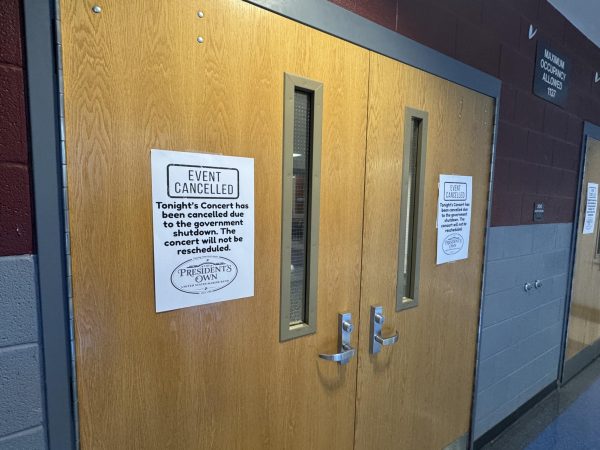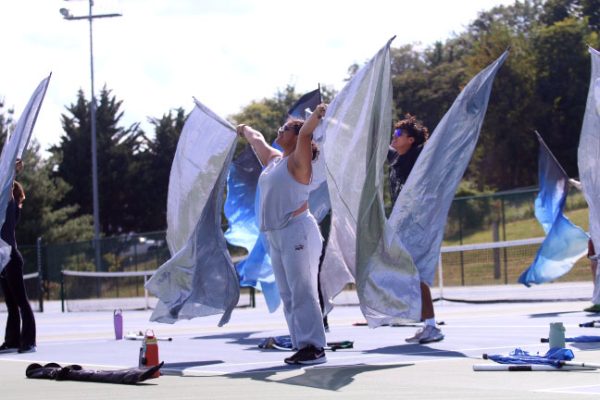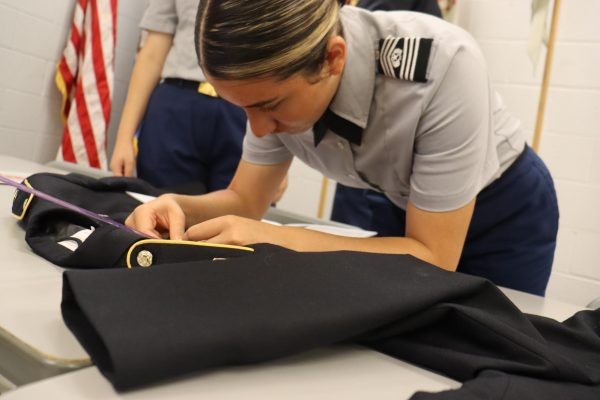Nichols, Butler first high school students to get COVID-19 vaccination in Harrisonburg
According to “Our World in Data,” 32.8 million doses of the COVID-19 vaccine have been given out. Four of those 32.8 million doses were given to senior Chloe Nichols and junior Juju Butler.
They both work at Bridgewater Retirement Community (BRC), one of the first places to receive vaccine doses in the Harrisonburg area, as certified nurses assistants (CNAs). As a part of the long term care and COVID-19 units, they were perfect candidates for the inoculation.
“Even before COVID-19, transmission of any disease, like the flu, has an extremely high chance of transmitting, whether that be from the resident to the aide or from the aide to the resident. When COVID-19 came, we saw how easy it was to spread this disease,” Nichols said. “They realized how important it was to protect [the] elderly in retirement homes because their immune systems are already so weak. When the vaccine became available, they wanted to target the places that were in need of it the most. Since retirement homes were the hot spot for COVID-19 and there [were many] flare ups across the country in retirement homes, they decided that this was the place [the vaccine] needed to go the most besides hospitals.”
During the COVID-19 crisis, Nichols and Butler experienced many changes in the nursing home. The most notable of which was uniform change. Each CNA wears a KN-95 mask, if anybody in the home is exposed or has COVID-19, the uniform changes to add a gown, goggles, a face shield, and a KN-95 mask. If a resident contracts COVID-19 they are moved into a COVID-19 unit to help stop the spread.
“In the COVID-19 unit you have to wear a white Tyvek suit, which is what people call ‘the astronaut suit’. For some people, the KN-95 doesn’t fit their face. I am one of those people [because] my face is too small and the [masks] are too big,” Nichols said. “They do this [mask fitting] test where they put this big yellow shield over your head and then they spray this sugary mist into there while you’re wearing the N-95, and if you can taste it or smell it, then the mask is too big for you. They put the smallest size on me, and I could still taste and smell. I had to wear this white shield helmet type thing [instead of a mask], and there was a belt that went along with it that has a little box in the back that connects to the helmet through black tubing. Once you press the on button that’s around your waist, it pumps cool air through, so you can breathe in clean sterile air.”
While Butler didn’t have to wear the “astronaut suit,” she was required to wear a gown and a mask at the minimum. Each day she was scheduled to work, she would get a text letting her know what she had to wear during her shift.
Although both Butler and Nichols want to pursue careers in healthcare, they were originally hesitant to take the vaccine. Both were scared of the long term effects, but realized that getting COVID-19 would be worse.
In the end, Nichols decided to get the vaccine because she realized it would benefit more than just herself.
“I was super scared about [the vaccine] being so new and not knowing the long term effects of the vaccination. Short term effects were already dealt out to us, in that we were probably going to feel a little achy, some injection site soreness, maybe some nausea and just basically some COVID-19 symptoms, but on a dimmed down level. I was hesitant because I didn’t know what to expect in a year or two, but I talked to one of my coworkers, and they were telling me that if you get COVID-19 [you don’t know] what your long term effects will be in a year or two,” Nichols said.
Nichols has experienced debilitating side effects that COVID-19 has by observing her residents before and after they contracted the virus.
“We already know from working with COVID-19 patients that there [are] long term respiratory issues and neurological issues [after you contract it]. We’ve seen it first hand how one of our residents [used to breathe] perfectly fine on their own before COVID-19, but after they got COVID-19, they have to be on oxygen all of the time. The little things like standing up to use the bathroom makes them lose their breath. I know that they are elderly, but it’s still something that we are sure of that can happen. It’s kind of, are you willing to take the long term risks of the COVID-19 vaccination or COVID-19 itself,” Nichols said.
The vaccine went through multiple trials and the technology used in it was developed years earlier, so Nichols decided to trust the scientists that created the vaccine.
“I [also thought] I’m going to trust science, I believe in science [and] this is what I want to study. I’m going to trust the scientist that made this vaccination, [because] this is what we need. Masks are very effective, but we’ve reached that point where not everyone wants to wear them and something else needs to be done to get rid of this [virus],” Nichols said. “If the vaccine is that [thing] then I’m willing to take it. I’ve kind of outweighed the pros and the cons within the vaccination and came up
with getting it is the right thing to do and that there is a little bit of uncertainty that comes with it, but I know in the end I’m protecting my residents, myself and my community.”
Butler came to the conclusion that the vaccine would greatly benefit the residents that she works with, which gave her the confidence to get vaccinated.
“My thoughts on it were that I was a little bit nervous because it is so new and they don’t have a lot of research on the long term effects. I wasn’t really worried about the short term effects. After speaking to my charge nurses at work, I realized that putting the residents’ lives and wellbeing was more important than my concerns,” Butler said.
Getting the vaccination included a longer process than other inoculations. Every eligible person in the nursing home was notified around early December and given instructions to talk to their doctors about any preexisting health conditions. After that, each person had to sign consent forms and have their insurance card before even being allowed near the vaccines.
“There were designated time slots to go and you just got a vaccine card. CVS was there administering the vaccine, [and] you just went in there and got the vaccine. Then you waited for 15 minutes in the lobby in case you had a bad reaction and didn’t take the vaccine well. There was nobody at my [workplace] that had to get any medical attention from the vaccine. That was really good,” Butler said.
Both Butler and Nichols experienced minor symptoms after both doses, the biggest of which was a sore arm.
Despite having almost total immunity, Nichols and Butler have chosen to continue wearing their masks and they are still required to wear them while working. To keep everybody safe BRC has decided to use protective equipment in the same way until a majority, if not all team members, are vaccinated.
“Unfortunately there was low [vaccination] turnout for staff in long term care at Bridgewater. We did not have a majority of people come and get it. There’s a bunch of people working at long term care that don’t have
the vaccination, [and they] still hold the same amount of risk that we had before. This is just to ensure safety upon the residents [because of their high risk]. It’s not because the vaccine isn’t effective; [it’s] solely because of residents’ health and putting their safety first. I still have to wear a mask every shift to work,” Nichols said.
The biggest challenge for the retirement community is vaccinating everyone in the building. However, Butler is now allowed to wear less PPE to work.
“We are still definitely wearing masks at work. I do still wear my mask in public, and I choose to social distance as much as I can. I am not completely sure on whether or not you are allowed to take off your mask after getting the vaccine, but given that I still wear it at work, I still wear it in public. A lot of stores are still mandating the mask vaccine or not, so I never have and I never will deny [wearing
a] mask,” Butler said.
Butler has experienced many deaths during COVID-19. This has influenced her to speak out about preventing COVID-19 and the safety of the vaccine.
“If anyone is reading this and has the opportunity to get the vaccine, I extremely encourage getting the vaccine, because it’s not about you, it’s about helping others [and] preventing the spread. This pandemic is bigger than us and it’s calling for everyone to come together and make a big difference.” Butler said.
Your donation will support the student journalists of Harrisonburg High School. Your contribution will allow us to purchase equipment and cover our annual website hosting costs.












